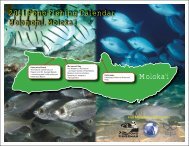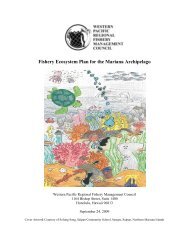Shark Depredation and Unwanted Bycatch in Pelagic Longline
Shark Depredation and Unwanted Bycatch in Pelagic Longline
Shark Depredation and Unwanted Bycatch in Pelagic Longline
Create successful ePaper yourself
Turn your PDF publications into a flip-book with our unique Google optimized e-Paper software.
Chile Artisanal Mahimahi <strong>and</strong> <strong>Shark</strong> Longl<strong>in</strong>e Fishery <strong>and</strong> Longl<strong>in</strong>e Swordfish Fishery<br />
A2.11. Reasons for Discard<strong>in</strong>g <strong>Shark</strong>s<br />
There are no m<strong>in</strong>imum capture size regulations for sharks <strong>in</strong> Chile.<br />
As a result, most respondents (95.5%) <strong>in</strong>dicated that they do not<br />
discard any sharks once they are hooked. However, most mahi<br />
mahi fishermen (72%) reported discard<strong>in</strong>g sharks for the follow<strong>in</strong>g<br />
reasons: (1) when catch<strong>in</strong>g blue sharks they reta<strong>in</strong> f<strong>in</strong>s only (44%<br />
respondents), (2) when sharks are small (22% respondents), <strong>and</strong> (3)<br />
when there is chance sharks would contam<strong>in</strong>ate the catch of mahi<br />
mahi (6% respondents).<br />
Swordfish fishermen, on the other h<strong>and</strong>, report storage capacity<br />
(50%) as one of the ma<strong>in</strong> reasons for discard<strong>in</strong>g sharks. One quarter<br />
(25%) of respondents mentioned that they reta<strong>in</strong> mako sharks only.<br />
<strong>Shark</strong> meat <strong>and</strong> f<strong>in</strong>s are marketable for blues <strong>and</strong> makos <strong>and</strong> prices<br />
are generally equal to or higher than that of the target species mahi<br />
mahi. This high value for <strong>in</strong>cidental shark take means that fishers will<br />
not discard <strong>in</strong>cidentally captured sharks. For swordfish fishermen,<br />
revenue from shark f<strong>in</strong>s is considered a significant source of extra<br />
<strong>in</strong>come that almost equals their <strong>in</strong>come from swordfish.<br />
A2.12. Practices Employed to Reduce <strong>Shark</strong> Capture<br />
<strong>and</strong> <strong>Depredation</strong><br />
Some mahi mahi fishermen (36.8%) identified several strategies to<br />
reduce shark capture <strong>and</strong> depredation. Strategies mentioned were<br />
varied - from establish<strong>in</strong>g regulations <strong>and</strong> bans to us<strong>in</strong>g rotten<br />
bait. The other 57.9% mentioned that there is not much that can be<br />
done to reduce shark capture or depredation s<strong>in</strong>ce sharks are found<br />
everywhere. However, fishermen employ strategies to <strong>in</strong>crease<br />
mahi mahi capture which <strong>in</strong>directly reduce shark capture. The<br />
most commonly identified practice to avoid shark <strong>in</strong>teractions is by<br />
chang<strong>in</strong>g fish<strong>in</strong>g position. Dur<strong>in</strong>g mahi mahi season fish<strong>in</strong>g areas<br />
are closer to shore than those areas fished dur<strong>in</strong>g shark season. Only<br />
26.3% of fishermen <strong>in</strong>terviewed <strong>in</strong>dicated that they would change<br />
fish<strong>in</strong>g position <strong>in</strong> order to reduce gear loss if the catch of sharks was<br />
especially high <strong>and</strong> because they are more <strong>in</strong>terested <strong>in</strong> fish<strong>in</strong>g for<br />
mahi mahi. Almost three quarters (73.7%) of respondents <strong>in</strong>dicated<br />
that they would rema<strong>in</strong> <strong>in</strong> the fish<strong>in</strong>g zone. The ma<strong>in</strong> reason given<br />
for this response was that it is profitable for fishermen when they<br />
encounter a zone with high shark catch.<br />
All swordfish fishermen <strong>in</strong>terviewed replied that they would change<br />
fish<strong>in</strong>g position if the catch of sharks was especially high.<br />
A2.13. Reasons for Discont<strong>in</strong>u<strong>in</strong>g any Methods<br />
Attempted to Reduce <strong>Shark</strong> Interactions<br />
No fishermen <strong>in</strong>terviewed had heard or tried a method to reduce<br />
shark <strong>in</strong>teractions. However, over a quarter (26.5%) of mahi mahi<br />
fishermen mentioned that they use or have used wire leaders as a<br />
means to reduce shark damage.<br />
A2.14. Perceptions on Efficacy <strong>and</strong> Commercial<br />
Viability of Strategies to Reduce <strong>Shark</strong> Interactions<br />
A2.14.1. Avoid<strong>in</strong>g peak areas <strong>and</strong> times of shark abundance<br />
Most (84.2%) mahi mahi fishermen believe that shark catch rates<br />
will be highest <strong>in</strong> certa<strong>in</strong> areas which are different from those of the<br />
target species. As a result, almost three quarters (73.7%) believe that<br />
it is possible to avoid peak areas <strong>and</strong> times of high shark abundance.<br />
However, while some fishermen (14.2%) stated that they would do<br />
that <strong>in</strong> order to keep fish<strong>in</strong>g for mahi mahi, others (28.6%) believe<br />
that avoid<strong>in</strong>g peak shark areas is not profitable. Only 4% of all mahi<br />
mahi fishermen <strong>in</strong>terviewed replied that an avoidance strategy is<br />
not possible because sharks are sometimes encountered along with<br />
the target species. Two of three swordfish fishermen believed that<br />
it is possible to avoid areas of especially high shark abundance <strong>and</strong><br />
one stated that he would stay <strong>in</strong> high catch shark zones if swordfish<br />
captures were equally high.<br />
A2.14.2. Reduc<strong>in</strong>g the detection of baited hooks by sharks,<br />
such as by refra<strong>in</strong><strong>in</strong>g from chumm<strong>in</strong>g dur<strong>in</strong>g the set <strong>and</strong><br />
not discard<strong>in</strong>g offal <strong>and</strong> spent bait dur<strong>in</strong>g the haul<br />
More than half of mahi mahi fishermen (52.6%) believed that refra<strong>in</strong><strong>in</strong>g<br />
from chumm<strong>in</strong>g dur<strong>in</strong>g the set <strong>and</strong> refra<strong>in</strong><strong>in</strong>g from discard<strong>in</strong>g offal<br />
<strong>and</strong> spent bait dur<strong>in</strong>g the haul will reduce shark depredation <strong>and</strong><br />
bycatch. In contract, two of three swordfish fishermen did not believe<br />
this strategy would be helpful <strong>in</strong> reduc<strong>in</strong>g <strong>in</strong>teractions with shark<br />
species. Most mahi mahi fishermen mentioned that caught target<br />
species are usually gutted at port.<br />
A2.14.3. Limit<strong>in</strong>g shark access to baited hooks, such as<br />
alter<strong>in</strong>g fish<strong>in</strong>g practices to consider deployment depth of<br />
hooks <strong>and</strong> tim<strong>in</strong>g of the soak <strong>and</strong> haul to avoid problematic<br />
shark species<br />
Most (84.2%) mahi mahi fishermen believe that it is not possible to<br />
reduce shark <strong>in</strong>teractions by sett<strong>in</strong>g baited hooks shallower or by<br />
reduc<strong>in</strong>g soak<strong>in</strong>g time because they still have shark <strong>in</strong>teractions<br />
when sett<strong>in</strong>g baited hooks shallower. In contrast, two of three<br />
swordfish fishermen believe it is possible.<br />
A2.14.4. Deterr<strong>in</strong>g sharks such as with chemical shark<br />
deterrents <strong>and</strong> electrical deterrents<br />
Only 21% of respondents believe that deterrents, such as chemical<br />
compounds <strong>and</strong> electrical current, will not be effective at reduc<strong>in</strong>g<br />
shark bycatch <strong>and</strong> depredation. Over two thirds (68.4%) of<br />
respondents believe that us<strong>in</strong>g shark deterrents would not feasible<br />
s<strong>in</strong>ce they would be very expensive <strong>and</strong> could damage target species<br />
<strong>and</strong> contam<strong>in</strong>ate the ocean. One fisherman (5.6%) stated that he<br />
does not want to deter sharks, <strong>in</strong>stead he wants to capture them due<br />
to their high economical value. Two swordfish fishermen replied<br />
that they did not know of these deterrents <strong>and</strong> whether or not they<br />
would be effective. The other swordfish fisherman believes that these<br />
deterrents will not be effective at reduc<strong>in</strong>g shark <strong>in</strong>teractions.<br />
63












